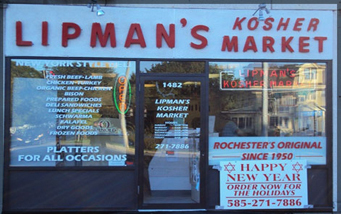REDWOOD CITY, Calif.--(BUSINESS WIRE)--Impossible Foods received its official kosher certification from the Union of Orthodox Jewish Congregations of America (the “Orthodox Union” or OU), the world’s largest kosher certification agency.
The award-winning Impossible Burger is now recognized as a Kosher Pareve food, marked with the universally-recognized OU symbol and included in the OU database registry of more than 200,000 kosher certified foods.
“Getting kosher certification is an important milestone,” said Impossible Foods CEO and Founder Dr. Patrick O. Brown. “We want the Impossible Burger to be ubiquitous, and that means it must be affordable and accessible to everyone -- including people who have food restrictions for religious reasons.”
Impossible Foods is in the process of getting Halal certification later this year.
KOSHER CHEESEBURGERS: DREAM? OR IMPOSSIBLE?
Earlier this year, a Rabbinic Field Representative toured the Impossible Foods’ 67,000-square-foot manufacturing facility in Oakland, Calif., which produces 500,000 pounds of plant-based meat per month. The rabbi confirmed that all ingredients, processes, and equipment used to make the Impossible Burger are compliant with kosher law, derived from the Torah's Books of Leviticus and Deuteronomy.
Jewish dietary laws (known as “kashrut”) prohibit the consumption of pigs, shellfish and most insects, and they specify certain slaughterhouse processes. In addition, dairy and meat products may not be prepared or eaten together.
The Impossible Burger is produced without slaughterhouses, hormones or antibiotics. It contains no cholesterol or artificial flavors. It uses about 75% less water, generates about 87% fewer greenhouse gases, and requires around 95% less land than conventional ground beef from cows.
The Impossible Burger contains no animal ingredients whatsoever. It’s made from simple ingredients, including water, wheat protein, potato protein and coconut oil.
One special ingredient – heme – contributes to the characteristic taste of meat and is the essential catalyst for all the other flavors when meat is cooked. Heme is an essential molecular building block of life, one of nature’s most ubiquitous molecules. Although it’s found in all living things and in virtually all the food we eat, it’s especially abundant in animal tissues. Impossible scientists discovered that it’s the abundance of heme in animal tissues that makes meat taste like meat.
To satisfy the global demand for meat at a fraction of the environmental impact, Impossible Foods developed a far more sustainable, scalable and affordable way to make heme and therefore meat, without the catastrophic environmental impact of livestock. The company genetically engineers and ferments yeast to produce a heme protein naturally found in plants, called soy leghemoglobin.
The heme in the Impossible Burger is identical to the essential heme humans have been consuming for hundreds of thousands of years in meat — and while it delivers all the craveable depth of beef, it uses far fewer resources.
“I'm really excited to be able to announce that the Impossible Burger is now kosher. And because our meat is purely plant-based, for the first time we can all enjoy a delicious -- and strictly kosher -- cheeseburger,” said Impossible Foods’ Chief Science Officer Dr. David Lipman.
The son and grandson of kosher butchers and cattle brokers, Lipman worked in the family business, Lipman’s Kosher Market, starting at the age of 7. His grandfather, Morris Lipman, co-founded the business in 1930 in Rochester, N.Y.
BIG TASTE, SMALL FOOTPRINT
The Impossible Burger is now served in more than 1,600 restaurants across the United States and in Hong Kong. With demand still outstripping supply, Impossible Foods is now hiring for a second shift at its Oakland facility and plans to double capacity this summer. To learn more about Impossible Foods’ plant in Oakland, watch this video.
In development since 2011, the Impossible Burger debuted in July 2016 at Chef David Chang’s Momofuku Nishi in Manhattan. The Impossible Burger is the only plant-based burger to win a 2017 Tasty Award and a 2018 Fabi Award from the National Restaurant Association.
Just last month, America’s original fast-food restaurant, White Castle, added the Impossible Slider to menus in 140 restaurants nationwide. The Impossible Burger is the only plant-based burger featured in America’s most beloved “better burger” concepts Fatburger, Umami Burger, Hopdoddy, The Counter, and B Spot, the Midwest burger restaurant owned by Chef Michael Symon.
ABOUT IMPOSSIBLE FOODS
Based in California, USA, Impossible Foods makes delicious, nutritious meat and dairy products directly from plants -- with a much smaller environmental footprint than foods from animals. The privately held company was founded in 2011 by Patrick O. Brown, M.D., Ph.D., formerly a biochemistry professor and Howard Hughes Medical Institute investigator at Stanford University. Investors include Horizons Ventures, Khosla Ventures, Bill Gates, Google Ventures, UBS, Viking Global Investors, Temasek, Sailing Capital and Open Philanthropy Project.
More information:
www.twitter.com/impossiblefoods
www.facebook.com/impossiblefoods
www.instagram.com/impossible_foods
Press kit: https://impossiblefoods.app.box.com/v/presskit



